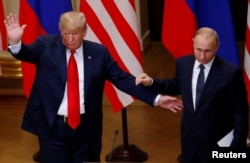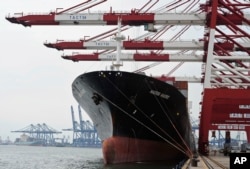U.S. President Donald Trump's apparent quest to kindle a bromance with Russian leader Vladimir Putin has made some Americans squirm. His performance in Helsinki, expressing confidence in Putin instead of U.S. intelligence agencies, ignited outrage across the political spectrum back home.
Should Beijing worry that Trump could succeed in pulling Putin away from his relationship with China and its president, Xi Jinping? Probably not, political analysts say.
Trump's charm offensive might cause Beijing a twinge of unease, given its tumultuous history with Moscow. But in this triangle, Putin and Xi are linked by strategic necessity, plus genuine personal affection.
"Trump has made clear that he is a big fan of Putin,'' said Li Xin, director of the Russia center at the Shanghai Institute of Foreign Studies.
"But everyone knows that Trump frequently changes his mind,'' said Li. "His attempts to be friendly cannot compete with the history and the intimacy of Xi and Putin's relationship.''
Practical arrangement
Moscow and Beijing are linked by practical and political needs.
China wants Russian oil and gas to power the world's second-largest economy. Moscow needs Chinese trade and investment more than ever following its estrangement from the West over its 2014 annexation of Crimea.
They share a loathing of Islamic radicalism in Central Asia and resent U.S. global dominance.
"Both leaders seek to curtail American influence, weaken U.S. alliances and modify the international system so it is more favorable to them,'' Bonnie Glaser of the Center for Strategic and International Studies in Washington said in an email.
Trump raves about Putin's political skills, but the Chinese and Russian leaders have long enthused publicly about their unique rapport.
Ahead of a visit to Beijing in June, Putin reminisced about celebrating his birthday with Xi over vodka and sausages five years ago.
"I've never established such relations or made such arrangements with any foreign colleague, but I did it with President Xi,'' Putin told Chinese state TV.
Xi presented Putin with China's first "friendship medal'' — an ornate gold necklace — and called him "my best, most intimate friend.''
The Russian and Chinese presidents have spent more time with one another than either has with any other foreign leader.
As far as it is possible for global leaders to become real friends, they are "setting a pretty high bar,'' said Alexander Gabuev, a Sino-Russian relations expert at the Carnegie Moscow Center.
"China has nothing to worry about,'' said Gabuev.
Following the Helsinki summit, China's Foreign Ministry welcomed improved U.S.-Russian relations. A spokeswoman said Beijing was "full of confidence'' about its own ties with Moscow.
"China-Russia relations will not be affected by any external factors,'' said Hua Chunying.
Chinese influence
Yet there is the remote possibility Washington and Moscow might one day feel the need to unite against China if its rising influence tramples their interests, suggested commentator Harry Kazianis.
"While we might rightly see Moscow as a rogue nation today, tomorrow it could be a partner in containing a common foe,'' Kazianis wrote this month in The American Conservative.
That is unlikely anytime soon, experts say.
Trump backtracked on one of his comments after the outcry back home over his apparent dismissal of U.S. intelligence reports that Moscow meddled in the 2016 election.
Rather than view Trump as a rival for Russia's friendship, China is more likely to be pleased by the growing split between Trump and American allies in Europe.
"Beijing has better ties with both Washington and Moscow than they have with each other,'' Glaser said. "China likely expects that Trump's visit will not change this reality.''






